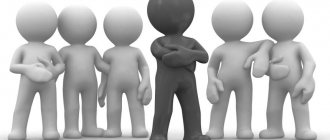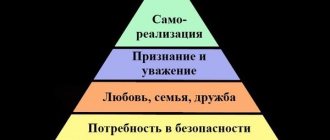Each inhabitant of our vast planet has its own basic needs, even the simplest ones - single-celled ones. If all the needs experienced are not met, the creature will not be able to function normally, feel comfort and enjoy life. Humanity has a significant number of requests that must be fulfilled in a timely manner in order to continue to live. In this article I will talk in detail about the physiological needs of a person and give a detailed definition of what they are.
What are physiological needs
Human physiological needs are the most important driver of behavior for both individuals and entire nations. We know from history how, fleeing hunger, tribes on barren lands went to war against their neighbors, recapturing their fields and livestock. The thirst of those lost in the desert could push them to kill if another person stood between them and the water. Therefore, no one will argue about the importance of these human needs. However, fortunately, people do not live only by them. Otherwise, absolutely nothing would distinguish us from animals living by instincts. What, besides food and water, does a person need? Let's look below.
Human needs for health and illness
Human needs
for health and illness
To live, be healthy and happy, people need food, air, sleep, etc. A person independently satisfies these needs throughout his life. They largely depend on the behavior or lifestyle of a person. The disease also interferes with the satisfaction of needs and leads to discomfort.
In 1943, the American psychologist A. Maslow developed the theory of the hierarchy of needs that determine (guide) human behavior. According to his theory, some needs are more important for a person than others. This provision made it possible to classify them according to a hierarchical system: from physiological (lowest level) to needs for self-expression (highest level).
A. Maslow arranged 14 vital human needs in order of priority for their satisfaction: from the lowest physiological, innate to the highest psychosocial, acquired in the process of growth and development, in the form of a pyramid. At the same time, at the base of the pyramid there are lower physiological needs, since they are the basis of human life, without them life in the biological sense of the word is impossible. If a person does not satisfy these needs, then he will simply die, like any living creature on Earth.
People's ability to satisfy their needs varies and depends on several factors: age, environment, knowledge, skills, desires and abilities of the person himself.
First of all, lower order needs are satisfied, i.e. physiological.
4.1. Physiological needs
To live, a person needs to satisfy the physiological needs of air, food, and water. In addition, each of us needs movement, sleep, fulfilling physiological needs, as well as communicating with people and satisfying our sexual interests.
It should be remembered that physiological needs are the same for all people, but are satisfied to varying degrees.
Oxygen requirement
(normal breathing) is a basic physiological need of a person.
Breath and life are inseparable concepts. Man learned a long time ago: dum spiro spero
(Latin) - while I breathe, I hope. Many words in Russian have a “breathing” meaning: rest, inspiration, spirit, etc. Maintaining this need should be a priority for the nurse. The cerebral cortex is very sensitive to lack of oxygen. With a lack of oxygen, breathing becomes frequent and shallow (tachypnea), and shortness of breath appears. For example, a prolonged decrease in oxygen concentration in tissues leads to cyanosis: the skin and visible mucous membranes acquire a bluish tint.
By satisfying the need for oxygen, a person maintains the blood gas composition necessary for life.
Need for food.
Nutrition is important for maintaining health and well-being. Parents, satisfying the baby’s need for balanced nutrition, show not only parental care, but also provide the child with the opportunity for normal growth and development. A healthy diet for adults helps eliminate risk factors for many diseases. For example, coronary heart disease is caused by eating foods rich in saturated animal fats and cholesterol.
A diet high in grains and plant fibers reduces the risk of colon cancer. Adequate nutrition during illness promotes recovery. Thus, a high protein content in food promotes the healing of wounds, including bedsores.
Let us note that an unmet human need for nutrition often leads to a deterioration in well-being and health.
Fluid requirement.
A healthy person should drink 12.5-3 liters of fluid daily. This amount of fluid replenishes physiological losses in the form of urine, sweat, feces and evaporation during breathing. To maintain fluid balance, a person must consume more fluid than they excrete, otherwise signs of dehydration appear. The patient’s ability to avoid many complications depends on the knowledge and skills of the nurse to anticipate dehydration.
The need for physiological functions.
The undigested portion of food is excreted from the body in the form of feces. The act of defecation and urination is individual for everyone, and their satisfaction cannot be delayed for a long time. Most people consider these processes personal and intimate and prefer not to discuss them. In this regard, the nurse, while providing assistance to the patient,
who has problems with the fulfillment of physiological needs, must be especially sensitive and, respecting the person’s right to confidentiality, provide him with the opportunity for privacy.
4.2. Security needs
Physical and psychological safety are second-level needs. For most people, security means reliability and convenience. Each of us needs shelter, clothing and a person who can help.
For example, the patient feels safe if the bed or wheelchair is fixed, the floor covering is dry and there are no foreign objects on it, the room is lit at night; a person with poor vision has glasses; he is dressed appropriately for the weather, his home is at a comfortable temperature, and he is confident that help will be provided to him if necessary. A person must be sure that he is able not only to ensure his own safety, but also not to cause harm to others. Everyone feels safe when their individual security requirements are met. The nurse must not only be able to ensure the patient’s safety, but also know his requirements for her.
Need for sleep and rest.
The alternation of periods of sleep and wakefulness is the main background for a person’s daily activities.
Research by T. Gower (1997) showed that women are more likely to suffer from fatigue caused by lack of sleep. Lack of sleep is second only to housework among the causes of fatigue. In cases where a person finds time to do business at the expense of sleep, he increases the debt of lack of sleep, since the duration of sleep for a modern person, necessary for normal existence, is at least 7-7.5 hours.
Without enough sleep, a person's health deteriorates. The level of glucose in the blood plasma decreases, the nutrition of the brain changes, mental processes slow down (attention is scattered, short-term memory deteriorates, the speed and accuracy of calculations slow down), and the ability to learn decreases. Studies conducted by American specialists (Gower T., 1997) indicate a decrease in the number of phagocytic cells in the body of a sleep-deprived person. It is known that we spend a third of our lives sleeping. A sick person needs sleep even more, as it helps improve well-being.
Sleep is “an altered state of consciousness that periodically occurs in a person for a more or less long time and contributes to the restoration of his strength and well-being” (Venderova M.I., 2000). There is a circadian biorhythm - a daily cycle of sleep and wakefulness. The state of drowsiness occurs twice during the day: from 00:00 to 04:00, then between 12:00 and 16:00. Despite a person's decreased sensitivity to external stimuli during sleep, this is a very active state. As a result of research conducted by M.I. Venderova (2000), several stages of sleep are identified.
Stage
I - slow
eye movement sleep (slow eye movement phase). Light sleep lasts a few minutes. During this period, there is a decline in the physiological activity of the body, a gradual decrease in the activity of organs and a slowdown in metabolism. At this time, a sleeping person can be easily awakened; if sleep is not interrupted, then the second stage occurs after 15 minutes.
Stage
II - slow
eye movement sleep (slow eye movement phase).
Light sleep, lasting 10-20 minutes. The vital functions of the body continue to weaken, and complete relaxation sets in. It is difficult to wake a person.
Stage
III - slow
eye movement sleep (slow eye movement phase).
The stage of deepest sleep, lasting 15-30 minutes. It is very difficult to wake up a sleeping person. The weakening of vital functions continues: this is complete relaxation, including a slowdown in heart rate.
Stage
IV - slow
eye movement sleep (slow eye movement phase).
Deep sleep lasting 15-30 minutes. It is still difficult to wake up a sleeping person. During this phase, physical strength is restored. Vital functions are much less pronounced than during wakefulness. Some people experience involuntary urination during this stage of sleep. Following IV, stage III, II, and then stage V of sleep begin again.
During the slow-wave sleep phase, breathing and heart rate slow down and muscles relax.
Stage
V - REM sleep
(rapid eye movement phase).
Vivid, colorful dreams are possible 50-90 minutes after stage I. Rapid eye movements are observed (at this moment the sleeper dreams), increased heart rate and respiratory movements, changes in blood pressure, and decreased skeletal muscle tone. During this phase, the mental functions of a sleeping person are restored; it is extremely difficult to wake him up, despite signs of more superficial sleep (increased respiratory movements and pulse). The duration of this stage is about 20 minutes.
After stage V of sleep, stages IV, III, II begin for a short time, then stages III, IV, V again, i.e. next sleep cycle.
REM sleep never occurs immediately; it is preceded by several stages of slow-wave sleep. The sleep of any person consists of a sequential alternation of 4-6 completed cycles, the duration of each of them is 60-90 minutes. The duration of REM sleep at the beginning of the night is a few minutes, and by the morning it is about 30 minutes.
Sleep is influenced by factors such as uncomfortable (unusual) posture, physical and/or mental illness, medications and drugs, lifestyle, emotional stress, environment and physical activity. Any illness that is accompanied by pain, physical illness, anxiety and depression leads to poor sleep. For example, with a pathology of the respiratory system, the patient has to put 2-3 pillows at night, which certainly affects the quality of sleep. With coronary heart disease, the patient is afraid to sleep for fear of a heart attack.
The effect of medications on sleep quality.
Sleeping pills create new problems for the patient rather than bring benefit. Many people are unaware of all aspects of caffeine and alcohol. In particular, caffeine is a long-acting psychostimulant (12-20 hours) that can reduce the depth of sleep. It is found in coffee, tea, chocolate and many soft drinks.
| Pharmacological drugs | Impact on sleep quality |
| Sleeping pills | Interferes with the development of the deep sleep stage. They provide only a temporary (1 week) increase in its duration. They lead to a hangover: the patient experiences daytime drowsiness, absent-mindedness and loss of strength. In elderly patients, an attack of suffocation may be initiated during sleep |
| Diuretics | Cause nocturnal polyuria |
| Antidepressants, psychostimulants | Suppress REM sleep |
| Alcohol | Speeds up falling asleep. Interrupts REM sleep. Promotes frequent awakening and impairs sleep resumption |
| Caffeine | Makes it difficult to fall asleep. Sometimes contributes to sleep interruption |
| Digoxin | Causes nightmares |
| (3-Adrenergic blockers | Causes nightmares, insomnia and rapid awakening |
| Tranquilizers | Reduces the duration of stages II and IV sleep |
| Narcotic drugs | Suppresses the REM stage of sleep. Abrupt cessation of use may increase the risk of arrhythmia. Promote frequent awakenings and cause daytime sleepiness |
The nurse should familiarize the patient with the prescribed medications and their effect on sleep.
Elderly and elderly people often experience sleep changes:
- it takes longer to fall asleep and reach the stage of rapid deep sleep;
• the total duration of sleep does not change, even if the person often wakes up at night, so the person often feels sleep-deprived;
• sleep is more often superficial, it is more difficult to fall asleep, frequent awakenings at night and early awakening;
• with age, the duration of shallow sleep increases, so a person often says that he “didn’t sleep a wink”
• during the day, an elderly person complains that it is difficult for him to do ordinary basic work, he gets tired quickly, and there is apathy.
Rest
- a state of reduced physical and mental activity. You can relax not only while lying on the sofa, but also during a long walk, reading books or performing special relaxation exercises. In a medical facility, rest may be disrupted by loud noise, bright lights, the presence of other people, and frequent medical procedures. Rest and sleep are essential for daily human functioning. Knowledge of the stages of sleep and the possible causes of sleep disturbance will enable the nurse to provide assistance to the patient and satisfy his needs with the means available to her.
Need for movement.
Limited mobility or immobility creates many problems for a person. Immobility is “a condition in which a person is unable to move or has difficulty making movements necessary for normal functioning” (Jeng M., 1995). This condition can be long-term or short-term, transient or permanent. It may be caused by the forced use of orthopedic systems (splint, traction, corset or any special means for holding the body), pain (in the joints, back, etc.); chronic disease (arthritis, residual effects of cerebrovascular accident, etc.), mental disorder (delirium, depression, etc.).
Immobility
- one of the risk factors for the development of trophic disorders (bedsores), pathological changes in the musculoskeletal system (osteoporosis, muscle atrophy, joint contracture), disturbances in the functioning of the cardiovascular and respiratory systems (especially in the supine position). With prolonged complete immobility, changes in the digestive system are observed (dyspepsia, flatulence, anorexia, diarrhea or constipation). Regular and intense straining, which the patient is forced to resort to during defecation in a supine position, leads to hemorrhoids, myocardial infarction, and cardiac arrest. Immobility causes urinary problems, which in turn leads to the development of urinary tract infections and/or urolithiasis.
And most importantly, an immobile person is deprived of communication with the environment, which influences the formation of his own “I”. The severity and duration of immobility have an impact on the psychosocial sphere of a person: learning ability, motivation, feelings and emotions change.
The nurse's assistance aimed at restoring mobility is important to improve the patient's quality of life.
4.3. Social needs
The most important needs for a person are the third level needs - social (the relationship of people in society): family, friends, communication, approval, affection, love, etc. Most people want love and understanding. No one wants to be abandoned and lonely, and if this happens, it means that the person’s social needs are not satisfied.
Elisabeth Kubler-Ross in her book “The Wheel of Life” writes: “I have never met a person who felt a stronger need for anything than for true, boundless love. You will find it in a simple act of kindness towards someone who needs help... It is what connects us to God and to each other.”
In case of serious illness, disability or old age, a vacuum often arises that disrupts social contacts; in such cases, the need for communication is not satisfied, especially among elderly and lonely people.
It is necessary to remember a person's social needs even in cases where he prefers not to talk about it. Helping a person solve his social problems can significantly improve the quality of life.
4.4. Self-esteem and esteem needs
When communicating with people, we cannot be indifferent to their assessment of our success.
A person develops a need for respect and self-esteem. The higher the level of socio-economic development of society, the more fully these needs are satisfied.
Often sick, disabled and elderly people are of no interest to anyone and there is no one to rejoice at their success, they do not have the opportunity to satisfy the need for self-esteem and the respect of others, so it is important to help them meet their needs, and in this the role of the nurse is enormous.
4.5. Self-expression needs
A. Maslow called self-expression the highest level of human needs. He believed that by satisfying their need for self-expression, everyone believes that they are doing something better than others. For one person, self-expression is writing a book, for another it is growing a garden, for another it is raising a child, etc.
In 1977, A. Maslow increased the number of levels in the pyramid to 7 and changed the list of needs. He introduced such important needs for a developed society as cognitive (including self-knowledge, knowledge of risk factors for one’s health, etc.) and aesthetic (cleanliness, beauty and symmetry, \
surrounding a person, improving mood, increasing quality of life), etc.
Of course, not every person feels the need to fulfill the needs of all 7 levels; this is influenced by education, culture, and social status. So, one patient strives to learn everything in order to stay healthy, another wants to know everything about his disease, and a third is not interested in anything. For many people in our society, it is important to satisfy their aesthetic needs even in a medical facility: the neatness of the medical staff, the cleanliness of the ward, the dining room, good furniture, walls and floors can seriously affect the well-being of the patient and his loved ones.
At each level of the hierarchy, the patient may have one or more unmet needs.
The nurse, when drawing up a plan of care for the patient, must help him implement at least some of them.
4.6. Application of A. Maslow's theory in nursing.
It is known that the main goal
Nursing care is
to provide
the patient with the necessary
quality of life
when a disease occurs, in other words, to create the maximum possible
comfort for the patient under the given conditions.
In case of violation
satisfying needs,
a state of discomfort develops.
In turn,
comfort is a state in which a person independently satisfies all his needs.
The following definition
of need can be given: it is a physiological and/or psychological deficiency of what is essential for human health and well-being.
Health
can be defined as
a dynamic balance
between the individual and the environment, achieved through adaptation.
This balance is achieved by satisfying a person’s needs.
Thus, nursing care is about creating comfort for the patient.
, i.e. conditions under which he can independently satisfy his needs.
The satisfaction of any need is ensured in the body by the functioning of organs and systems. Any disease disrupts the function of organs, therefore it is externally manifested by a violation of the satisfaction of any need. For example, the gastrointestinal tract (GI) meets needs such as eating, drinking, and excreting. Gastric ulcer is manifested by a violation of the satisfaction of these needs: the patient experiences heartburn, abdominal pain after eating, unstable stool, etc. A nurse, due to her knowledge and skills, is not able to diagnose a patient and influence the disease (only a doctor can do this), but she can identify a violation in meeting needs and create conditions for their satisfaction.
To do this, the nurse must collect complete information
about your patient. Only by clearly understanding the satisfaction of what needs are violated in the patient can she formulate the goals and objectives of nursing care, think through and draw up a plan, implement it and evaluate the results. Only by imagining the patient as an individual, as a single physiological and psychosocial whole, can a nurse count on his understanding and support in organizing care and effectively guide the patient towards improving his condition.
In relation to nursing practice, V. Henderson proposed a classification of needs based on the theory of the hierarchy of needs according to A. Maslow.
4.7. Conditions and factors influencing the method and effectiveness of meeting needs.
If we analyze the life of each person, it will become clear that, despite the fact that the needs of an individual and all people in general are the same, the way they are satisfied is individual.
The way to satisfy needs is called
a way of life
, therefore each person has his own way of life,
depending on age, socio-cultural environment - ecology;
knowledge, skills, desire and health. As a result of the examination and the generated database about the patient, the nurse must determine the needs that are poorly met in this patient and organize the nursing process.
4.8. The nurse's role in restoring and maintaining the patient's independence in meeting needs.
Helping the nurse meet the physiological needs of the patient
| Physiological needs | Help from a nurse |
| Need for air | Raise the head of the bed; teach coughing techniques |
| Food requirement | Provide assistance with eating; teach proper nutrition |
| Fluid requirement | Help with fluid intake and ensure sufficient amounts |
| Dispatch of physiological needs | Help the patient get to the toilet; teach how to use a urine bag |
Nurse helping a patient meet safety needs
| Type of need | Help from a nurse | |
| Need for reliability | Lower the bed to the lowest possible level; teach the patient to use a cane when walking | |
| Need for protection | Check frequently to see if a bedridden patient needs assistance. | |
| Need for clothing | Ensure that the patient is dressed appropriately for the weather | |
| Need for help | Provide the patient with a means of communication (mobile phone) when necessary | |
| Need for sleep | Provide comfortable sleeping conditions; find out the reasons for its violation | |
| Need for movement | Help the patient move; teach the patient and his relatives active and passive exercises in the joint | |
Helping a nurse help a patient meet social needs
| Type of need | Help from a nurse |
| Need for approval | Praise the patient if he has managed to expand his self-care capabilities |
| Need for understanding | Listen to the patient with genuine interest |
| Need for affection | Explain to the patient’s relatives the benefits of regular visits; make the patient feel important |
| Need for love | Explain to the patient’s relatives the importance of showing signs of love towards him |
| Need for family and friends | Help call home or friends |
The nurse's assistance to the patient in meeting the need for self-esteem and esteem
| Type of need | Help from a nurse |
| Need for encouragement | Sincerely praise and congratulate the patient for the success achieved |
| Need for respect | Address the patient by name and patronymic; make the patient understand the significance of his words |
| Need for self-esteem | Help the patient achieve self-esteem |
| Need for success | Help the patient share their success with others |
| The need to have an advantage | Teach the patient to use his advantage |
List of recommended educational literature for students
Main sources:
1. Obukhovets T.P. Fundamentals of nursing / T.P. Obukhovets, T.A. Sklyarova, O.V. Chernova. - Rostov on/D.: Phoenix, 2021. - (Medicine for you).
Additional sources:
1. Mukhina S.A. Theoretical foundations of nursing [Electronic resource]: textbook / S.A. Mukhina, I.I. Tarnovskaya - M.: GEOTAR-Media, 2021. - Access mode: https://www.medcollegelib.ru (access date: 03/30/2020).
2. Mukhina S.A. Practical guide to the subject “Fundamentals of Nursing” [Electronic resource]: textbook / S.A. Mukhina, I.I. Tarnovskaya. - M.: GEOTAR-Media, 2021. - 512 p. — Access mode: https://www.medcollegelib.ru (access date: 03/30/2020).
3. Kaligina L.G. Fundamentals of nursing: a guide to medical procedures \ L.G. Kaligina, V.P. Smirnov. – M.: Federal State Educational Institution “VUNMC Roszdrav”, 2006. – 430 p.
4. Osipova V.L. Disinfection: a textbook for medical schools and colleges / V.L. Osipova. – M.: GEOTAR-Media, 2014. – 136 p.
5. Osipova V.L. Nosocomial infection: a textbook for medical schools and colleges / V.L. Osipova. – M.: GEOTAR-Media,
2014. – 240 p.
6. Fundamentals of nursing: a textbook for secondary educational institutions / I.Kh. Abbyasov [and others]; edited by S.I. Dvoinikov. - M.: IC "Academy", 2009. - 336 p.
7. Fundamentals of nursing: educational and methodological manual for students / ed. A.I. Spirna. – M.: VUNMTs, 2003. – 420 p.
What needs does a person have besides physiological? Maslow's pyramid
This concept is interpreted differently in many branches of science. The famous American psychologist A. Maslow even created the so-called “pyramid of needs”. This is a unique model of human motivation. This pyramid has gained enormous popularity; it was literally taken brick by brick by marketers, psychologists and psychiatrists, advertising creators and management luminaries. However, the professor himself never used it to explain his theories. He considered the physiological needs of a person to be leading only when they were pathologically dissatisfied. Simply put, food becomes the main thing for a person during its (possibly long) absence. If the individual is full, then that need gives way to higher and more valuable ones.
At the heart of the diagram we see human physiological needs, such as hunger and thirst, as well as key sexual instincts (or libidinal, as the great Freud called them).
Safety comes second. The concept is somewhat vague, it includes the well-known concept of comfort, coziness, stability of the habitat (home), protection from external factors and possible enemies. And only in third place are social needs, that is, a person will think about their satisfaction after satiation and being in comfort. That is, the physiological need is key. After social ones (communication, care, general affairs), the fourth level of the diagram depicts the so-called “prestigious”, or needs for prestige, that is, for respect and self-esteem (whether these concepts are related or not, we’ll let psychologists figure it out). The crown of the pyramid is spiritual needs.
What other needs are there besides biological?
The creator of the pyramid of values, A. Maslow, considered the physiological need to be leading in something. This unique table in the form of a triangle gained great popularity, and psychologists, marketers, advertising specialists and management professionals immediately began to use it in their activities.
The basis of the pyramid is made up of biological needs, which I listed in detail above, the second step is occupied by the need for security (the presence of comfort, coziness, stable work). At the third level there are social values (communication, being in the spotlight). The fourth stage consists of prestigious needs - respect, recognition, self-sufficiency and independence. And the last level is spiritual values (art, creativity).
Why do you need to satisfy physiological needs?
Satisfaction of needs according to Maslow comes from the bottom up. That is, only with the most complete satisfaction of the lower level is a transition to the highest possible. The spiritual and social development of a person is important, but in the grip of hunger he simply will not have time for them. These schemes were used by tyrants and generals in ancient powers even before our era. Hungry people are easier to manage than well-fed people. The unsatisfied physiological needs of the human body prevented him from thinking, much less striving for freedom or independence. Fortunately, tyranny and the slave system have been almost eradicated today, but marketers and creators (creators of advertising) have taken possession of the truly magical secret pyramid. They construct their texts by appealing to the lower instincts of man.
Advantages and disadvantages
As is easy to see, the pyramid of needs is not just a classification of them, but reflects a certain hierarchy: instinctive needs, basic, sublime. Every person experiences all these desires, but the following pattern comes into force here: basic needs are considered dominant, and higher-order needs are activated only when the basic ones are satisfied. But it should be understood that needs can be expressed completely differently for each person. And this happens at any level of the pyramid. For this reason, a person must correctly understand his desires, learn to interpret them and adequately satisfy them, otherwise he will constantly be in a state of dissatisfaction and disappointment. By the way, Abraham Maslow took the position that only 2% of all people reach the fifth stage.
What are your true needs and motives? Find out in the Self-Knowledge course.
We also recommend reading:
- Storytelling
- Using Maslow's pyramid for self-actualization
- Spiral dynamics model
- Actions of a true leader
- 3 Eco-Friendly Ways to Get What You Need from Someone
- Kano model for analyzing a product or service
- Self-actualization
- Abraham Maslow "Motivation and Personality" - summary
- 6 Skills to Develop Emotional Intelligence
- Humanistic theories of personality: what to take from history to modern times
- Self-transcendence
Key words:1Self-knowledge
Physiological needs of the child
Why are we given physiological needs? The answer is simple - for survival. Without these needs, we simply would not be able to survive and live. A person is already born with these needs. This can be seen especially clearly in the example of newborns. Eating for a baby is usually caused by a demanding loud cry. And this is understandable, the child cannot say or demand what is necessary in any other way. The baby’s key needs are food, maternal warmth (which replaces several needs of our pyramid at once: safety and social contact), good sleep and normal well-being. When these needs of the child are met, we will get a calm, smiling child who wants to play and see something interesting; when dissatisfied - a continuously screaming and crying lump, reminiscent of a wounded animal.
Hierarchy of values
Abraham Maslow, the creator of the pyramid of needs (you will learn about it in detail by clicking here), believed that all of the above needs are leading only at the moment when their dissatisfaction is felt. The rest of the time, the individual is more concerned about material and spiritual values.
For example, do you think about how you breathe? Just like that, solving work issues and doing everyday things? Do you pay attention to this vital process until difficulties arise that prevent you from inhaling and exhaling? If you don’t meditate, or don’t try to perform techniques to calm yourself, then it’s unlikely. As long as there is no lack of oxygen, attention will be focused on other tasks.
Physiological needs of an adult
The needs of an adult repeat the needs of a child in everything, only one more particularly important instinct is added to them - reproduction (sexual, libidinal). This “basic instinct,” if dissatisfied, can turn a person into a real aggressor. With adequate hormonal background, of course. Nowadays, due to environmental pollution, poor nutrition and other factors, this need is muted for many. However, there are also people for whom it exceeds other needs, which pushes them to crime. Fortunately, there are only a few of them, and they most likely have a history of psychiatric pathologies.
As for healthy people, where this physiological need is in its rightful place, it is worth saying that it is wrong to both underestimate its importance and exaggerate it. The latter is characteristic of cinema and pop stars, who appeal with their appearance and creativity to this ancient instinct. A healthy, appropriate attitude is very important here. Intimate relationships are important for a person, but this does not mean that you need to indulge in them at every opportunity. The ideal option is marriage or a stable relationship with a loved one.
Theory and practice
According to many modern psychologists, despite the fact that Maslow’s pyramid is a clearly structured model, it is quite difficult to apply it in practice, and the scheme itself can lead to completely incorrect generalizations. If we put all the statistics aside, a number of questions immediately arise. For example, how dark is the existence of a person who is not recognized in society? Or, should a person who is systematically malnourished be considered absolutely hopeless? After all, in history you can find hundreds of examples of how people achieved enormous results in life precisely because their needs remained unsatisfied. Take, for example, poverty or unrequited love.
According to some reports, Abraham Maslow subsequently abandoned the theory he put forward, and in his subsequent works (“Towards the Psychology of Being” (1962), “The Far Limits of Human Nature” (1971)), the concept of personal motivation was significantly refined. And the pyramid, which many specialists in the field of psychology and marketing are trying to find application for today, has generally lost all meaning.
Food. How to prevent a need from becoming an addiction
Hunger and thirst, as we said above, were even the cause of wars and the nomadic life of our ancient ancestors. Fortunately, in civilized countries the concept of famine is familiar only from history textbooks. In popular culture, the other extreme is promoted - constant weight loss, pills to reduce appetite, health-improving fasting have become fashionable and popular things. But people who are led by advertising are often not aware that fighting the cornerstones laid down by nature is fraught with consequences for both physical and psychological health. Against the backdrop of the mass pursuit of the ideal body, clinical cases of bulimia (a mental or physiological disorder characterized by a constant desire to eat) and anorexia (refusal of food due to psychological personality disorders) are increasingly emerging. It is worth remembering that an unsatisfied need in the body can become addiction and mania.
Substitution
Biological needs, although they are very different in meaning and significance from the others, cannot be considered as separate. They are closely related to the desire to receive love, recognition, to show their independence, etc. Remember those same babies who require the breast, sometimes just to feel the closeness of their mother, to experience the reassurance that they are safe.
Have you heard about mental illnesses such as bulimia and anorexia? Modern society promotes the need to have an ideal body, which is why various weight loss products are actively and aggressively advertised everywhere. Sometimes success and intellectual abilities equal a beautiful appearance. This makes itself felt by the formed false stereotype. That only in excellent physical shape and a well-ironed suit can a person generate brilliant ideas and manage people.
So, when, thanks to diets, the digestion process is disrupted, if only because food rarely enters the body, disturbances also occur in a person’s ability to recognize the feeling of hunger. At times of stress, some people refuse food, some, on the contrary, abuse it in order to be distracted and switch. They try to “sweeten” their life with baking. Use large volumes to fill the feeling of “inner emptiness.”
The relationship with food may well develop into addiction, when it is difficult to control and limit yourself. Especially in moments of increased anxiety, restlessness, and dissatisfaction. This is why it is so important to be attentive to yourself and eat when you really feel hungry. And not just a desire to experience joy or calm down.
Healthy sleep as the most important need
Sleep is on a par with the needs for food and water, satisfaction of the sexual instinct and breathing. However, many downplay its importance, which is done in vain. The example of Napoleon, who slept several hours a day, will fade if we remember the unstable psyche and panic attacks of this historical character. Do you want to experience these “joys” for yourself? Hardly. Lack of sleep deprives us of psychological comfort, lowers the pain threshold (makes us more sensitive to pain), and negatively affects performance. An unsatisfied physiological need for sleep can even lead to visual and auditory hallucinations. Moreover, a sleep-deprived person working with machinery or transport can be deadly to those around him during the microsleep phase (a phenomenon when a person’s brain, which has not known rest or sleep for a long time, “turns off” for a split second).
Explanation of concepts
Biological needs are the most significant and valuable, as they ensure life. Even a slight denial of satisfaction can lead to negative consequences (illness, organ system disorders, weakness, death).
A need is a request that must be immediately fulfilled in order for the individual to feel good:
- felt protected;
- was important to others;
- functioned normally without any disruptions to the body;
- achieved goals and made dreams come true;
- felt satisfied.
Human physical needs are a type of need, failure to fulfill which leads to loss of life. If a person cannot support them, he will lose the opportunity to achieve goals, and if they are not satisfied at all, diseases and dysfunctions of the body will appear, which will lead to unnamed death (this does not apply to the desire for procreation).
Examples of biological queries:
- eating high-calorie foods for energy and sustenance;
- rest and sleep;
- air;
- liquid;
- desires of a sexual nature and procreation.
They are the lowest needs. They are required to be performed not only by human beings, but also by representatives of the entire animal world, even insects. However, in the simplest organisms this list is not so large.
General information
Purely theoretically, in the event of the death of civilization and the loss of what has been created by man over thousands of years of existence, from all the requests that are currently important (spiritual, creative, social), physiological needs will remain the most paramount, that is, only what is inherent in the animal to the world.
No matter how important spiritual and cultural values are for a person, it is vital for him to restore strength and activity: sleep, eat, drink, breathe. The level of created goods loses its meaning without satisfying natural basic needs.











